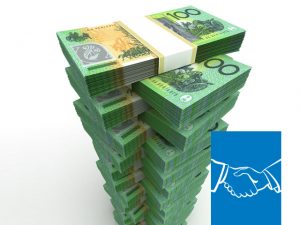Cost will be a discussion risk advisers will have with clients because many will base their final decision on that issue, instead of the benefit of advised insurance.
Advisers should not avoid these discussions claims KnowledgeMaster’s Jim Prigg who, in this article, outlines reasons why advisers should engage with client on this topic.
Following on from his previous article on why people are sometimes reluctant to commit, Jim outlines simple ways to talk about price and to overcome these types of objections.
Price objections in all sales jurisdictions exist. They always have. They always will. This price objection is generally comes about because not enough value has been created for the potential purchaser.
As an adviser, there are many ways to handle an honest objection on price. One effective technique is to break the price down to daily costs. Then compare it to common, even frivolous expenditures, saying something like “For $5.00 per day.- less than the cost of a cappuccino – you’ll be doing something very positive for your family.”
By positioning the cost against something else, your client will see the insurance product on offer is actually inexpensive compared with its value. It requires something like, “You’re right, you could purchase a less expensive product. But it wouldn’t be this product!” Then it is important to emphasize the key benefits separating one product from the others in the marketplace, highlighting those aspects of particular interest to your client.
If you’ve encountered an objection, the first thing you want to do is make your client feel that you really understand their concerns and considerations
When you put it this way, you’ve added value for money spent. You’ve positioned your product as being “worth it”, and very valuable. You aren’t apologising for price. They will realise you’re proud of what you have to offer. Try it. You’ll find people are more amenable to this type of approach.
The following tactical and strategic methods of answering and countering this objection are varied and of different intensity.
To deal with this objection one of the first things you need to say is “You’re right.”
You need to say that for a specific reason. If you’ve encountered an objection, the first thing you want to do is make your client feel that you really understand their concerns and considerations. You don’t want them to feel as if they have to defend their views. So agreeing with them takes out most confrontation and aggression.
Once a client has thought of an objection, they’re in a form of disagreement. The fastest way to breakdown their resistance and start to bring agreement back into the conversation is to agree with them. You show then that you understand their position to let them know that you see why they might have that consideration.
Saying “You’re right,” or “I understand how you might feel that way” leads back to agreement. Challenging them, or making them feel foolish or cheap, just creates defensiveness, mistrust or aggression. And that means you lose any leverage to get back to talking about your offer
Or as a bargaining point you can always resort to the classic “What do you want me to take out?” Is it not the case that buyers can have champagne tastes but beer budgets? Yet there is a place for a higher priced product and service. If that were not the case then Mercedes cars, first class business travel and houses in the better suburbs would not exist, would they? So when that expression of price differential arises there are some things you can do to help your client and yourself.
Maybe it is too high. Check it out to make sure it isn’t
What is the market, your competition and opposition doing? Don’t be afraid to ask your prospect or client the honest question “Compared to what”?
Spell out to prospects what they will gain from doing business with you instead of your competitors.
What do you have that is better, more reliable, offers better terms, superior returns, longer life or better service? Obviously there is a reason or reasons for why you are higher priced. Tell your customers why there is a premium price on your offer and how it benefits them.
Pinpoint the main reasons your price isn’t too high
What are the value-adds above and beyond the initial price factor? Do people keep coming back to you time and time again on a regular basis? If so then your price is not too high. Do they refer their friends, family and work associates to you? If so then your price is not too high. Do they recommend you? If so then your price is not too high.
- If you really feel our price is too high, what part of the offer/package would you like me to reduce?
Refer prospects to similar customers who are happy with your products and services
Will your satisfied customers give you an endorsement in writing, testimonial, appear in your advertising or let other people phone them to praise you, your company, your product or service?
Classic questions and answers
- I’m pleased you mentioned that because we do have credit card facility. If I could split it into 3 monthly instalments, would that help?
- Which part of the program can’t you afford?
- What part of the plan do you want me to take out?
- Have you got any other quotes yet?
- What would you consider to be a reasonable price?
- What are you prepared to invest for such a service?
- Have you got a figure in mind?
- What is your budget for this?
- How much did you think it would cost?
- How much do you think it should cost?
- What does it tell you if our competitor is much less? Perhaps they know how much their product is worth.
- It is high compared to what some companies charge. However, we place an extraordinary amount of business each year. Do you think all those other people would buy from us if they didn’t see the superior quality and the exceptional value they receive from us?
- Our price is too high? We very rarely hear that. Could you tell me what that means?
- Our price is too high? (Followed by complete silence with a smile.)
- If you really feel our price is too high, what part of the offer/package would you like me to reduce?
- The sweetness of low price is quickly forgotten when you have to deal with the bitterness of low quality or service day after day or forever, don’t you agree?
- We can deliver on a lower price right now, but you will have to tell me which options to cut from your proposal. Is that OK?
- If it were cheaper, would you still want it? If not, that’s good. Then what you are telling me is, that you want it.
- If price were the deciding factor in all purchases, then there would be no prestige cars; silver service in restaurants or business class in airline travel would there? Our service/product is superior because of the extra benefits you and many others like you have asked for and we can deliver.
- How much too high is it? Do you realise that if you keep and use our product for the next five years, and most people do, that works out to less than 10 cents a day! Isn’t it worth 10 cents a day to have the best?
- Where do you live? That’s a nice area. You are obviously someone who appreciates the finer things in life. Why are you denying yourself top quality on this item now? Does this make sense to you? What kind of car do you drive? Now that is class. You are a person who appreciates quality. Why are you trying to cut corners on this deal?
- Does your company pay you only to buy the cheapest products or do they want you to purchase the best value?
- Don’t be deceived by some quotes. You actually pay less with us because you receive more along the way. More service, more expertise, more security, better advice and more access to experts. Isn’t that what you are really interested in?
- How much too high? Let’s see if it is $365 too high that works out at just a dollar a day. Now if you know that our product is the best on the market it is worth it to have that extra quality for less than the price of a sandwich, a coke or cappuccino isn’t it?
- What are you comparing it against?
- Our price is high, compared to what some other companies in this field charge. But I believe it’s not high enough for what it does. As a matter of fact, we’re expecting a price increase any day. Why not buy now and get our high quality at today’s price?
- I am glad you mentioned price. That’s really the best part about buying from us. We’ll translate the purchase price into small instalments, so your actual cost per month will be lower with us than with almost any other company. Can we place an order for you today?
- I do know a way to save you a substantial amount of dollars. What if I cut my commission on this transaction to lower the price? Would that confirm the deal today?
- Yes, we are not the cheapest in our field. However, we have attracted over $xx million this year alone at these same prices. We couldn’t do that if our customers weren’t convinced that this is the best buy. Would you like to join the ranks of our happy customers who have gathered value for money invested?
- Let me ask you if that were the case why have we become number one in the market place?
- Price is important, but it is not the only consideration for you, is it?
- Is there something else on your mind apart from price?
- Which of these techniques are you utilising?
- Which of these techniques should you implement?
- Which of these techniques could you improve on?

This article is reprinted with permission from Jim Prigg CEO and founder of Knowledgemaster Pty Ltd. Knowledgemaster is an online resources company that delivers practical communications, interaction, sales and soft skills tips, tactics, techniques. Learn more about winning business programs and courses by contacting Jim.
Contact Jim Prigg to learn more about winning business programs and courses.
Contact or follow the author: Website | Email | Telephone: 03 5232 1500, 0408 520 453









